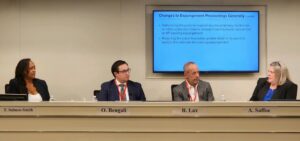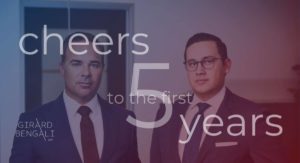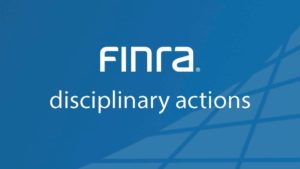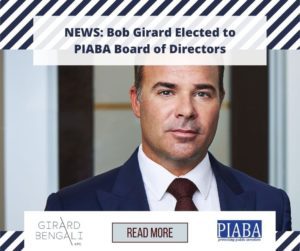On behalf of Girard Bengali, APC posted in securities arbitration and litigation on Monday, October 2, 2017.
Arbitration is a form of dispute resolution frequently used as an alternative to a traditional lawsuit. Instead of a judge or jury deciding the matter, one or more arbitrators are selected as neutral third parties to decide the dispute. The arbitrators read the parties’ written submissions, listen to witness testimony, review evidence, and ultimately issue a written decision, commonly referred to as an “award” (as opposed to “judgment”). The award is usually final and binding on all the parties: while a party can challenge a final award in court, it is extremely difficult to get it overturned. In California, courts are required by law to give deference to an arbitrator’s decisions and can overturn an award only under very limited circumstances.
FINRA and the FINRA Dispute Resolution, Inc.’s Forum
The Financial Industry Regulatory Authority (FINRA) is the self-regulatory organization that oversees the securities industry – it is not a governmental organization, but it does answer to the U.S. Securities Exchange Commission. FINRA registers broker-dealer firms and their representatives, enforces compliance with FINRA rules and federal securities laws, provides surveillance and other regulatory services for equities and options markets and controls the forum for disputes between investors and FINRA-registered firms and their representatives. (For more information about FINRA, go to www.finra.org) FINRA Dispute Resolution, Inc., is the entity that manages the arbitration claims, and the FINRA Code of Arbitration Procedure 1200, et seq., regulates the procedures that FINRA, the parties and the arbitrators must follow.
The majority of disputes that occur in the securities industry are decided in a FINRA arbitration. This is the direct result of a case called Shearson/American Express Inc. v. McMahon, 482 U.S. 220 (1987), a United States Supreme Court decision concerning arbitration of private securities fraud claims under the Securities Exchange Act of 1934. The Court held that claims arising under federal statutes may be compelled to arbitration if there is a valid and binding arbitration provision between the parties. It may seem surprising, but a statute from 1934 still affects investors’ rights today.
FINRA maintains a roster of available arbitrators who have taken courses offered by FINRA in dispute resolution/arbitration. Many also have training in dispute resolution from other providers, including law schools and court programs, but some do not. Other than its own mandatory courses, there are no other requirements established by FINRA or FINRA to qualify as an arbitrator. The arbitrators come from all walks of life: grade school teachers, farmers, military, business professionals, financial advisors, practicing attorneys and a myriad of others. It is important to note that some of FINRA’s more veteran arbitrators have presided over numerous cases involving the same broker-dealer firms, so they have familiarity with the firms, their counsel – and their arguments. By the same token, they also are familiar with certain attorneys who appear before them regularly as counsel for investors and/or securities professionals.
Unlike most court filings, FINRA arbitrations are confidential, and the parties’ documents submitted in arbitration are not publicly available. It is only the final award that is made available to the public, via FINRA’s Arbitration Awards Online database. These awards may be searched by the name of a party, the name of an attorney, the name of an arbitrator, the case number and date of the final award. Unless requested by the parties prior to hearing (or if an employee is seeking expungement), FINRA arbitration panels are not required to provide any kind of analysis to support their decisions.
FINRA-registered firms and their registered representatives must disclose any award issued against them on their professional records, which can be accessed through FINRA’s BrokerCheck. The BrokerCheck also lists the employment history for individual brokers and other kinds of disciplinary information, so it is a useful resource when researching firms and securities professionals.
The Industry’s Duty to Arbitrate
With few exceptions, broker-dealer firms and their employees who act as financial advisors are required to be registered with FINRA. FINRA requires registered industry professionals and their firms to arbitrate disputes with investors in the FINRA forum, even in the absence of a written contract with the investor. It is unlikely that an investor would not have a written agreement, because FINRA member firms generally require their clients to sign account agreements containing FINRA arbitration clauses. Even though this obliges an investor to give up the right to a jury trial, the U.S. Supreme Court has held that these arbitration clauses are enforceable. See Shearson/American Express Inc. v. McMahon, 482 U.S. 220 (1987).
Time and Money in a FINRA Arbitration
Be forewarned: from the time a claim is filed with FINRA, it could take well over a year to complete the arbitration process and receive an award (generally, an award is rendered 30 days after the final hearing). Surprisingly, this is still faster than most court cases, at least in California.
A FINRA arbitration is not cheap, but neither is a lawsuit. Just like the courts, the costs of arbitration vary, depending on the amount of the claim, the complexity of the issues involved, the number of hearings, the volume of documents and the need for motion practice. Discovery (i.e., demanding and producing evidence) is commonly the most expensive phase of any dispute, but in FINRA, it is more limited than in a court case. In FINRA, parties are usually restricted to requests for documents and written information, whereas in court, the parties may demand depositions, copious written disclosures and other laborious tasks. FINRA’s limitations on discovery can greatly reduce the costs compared with a lawsuit in court, but it also means certain evidence, like witness testimony, may not be accessible until the hearing.
The courts and FINRA both charge the parties forum fees, such as initial filing fees, but normally courts require fees for every document filed. FINRA does not charge for every document filed, but it does have its own sets of fees, such as honorariums for the arbitrator(s).
FINRA is intended to be an “equitable” forum, which means the arbitrators have significant leeway to do what they believe is “right,” not just legally correct. In many cases, the arbitrators shift the burden of forum fees to the losing party, if they feel it is the “right” thing to do. In some instances, the contract between the parties will govern who is responsible for forum fees, and this also may affect the final cost of the arbitration process.
Legal Representation in a FINRA Arbitration
While parties have the right to represent themselves in a FINRA arbitration, member firms invariably will have an attorney (or two!) to represent them. In addition, firms regularly pay for their employees’ legal representation, provided there is no conflict of interest between the employer and employee. Firms get sued by investors on a regular basis, so their legal counsel usually has substantial experience and a thorough knowledge of FINRA arbitration procedures, securities laws, and, significantly, experience with the same arbitrator(s) from prior cases. An uninformed investor, especially if emotionally involved, may find going up against seasoned legal counsel overwhelming, and the process of preparing and presenting a case overly complicated.
Whether ready to file suit, or merely in need of a trained eye to evaluate the strengths – and weaknesses – of your claims, it is wise to retain knowledgeable counsel with extensive experience in the FINRA arbitration forum. Like the FINRA member firms’ legal counsel, your counsel should have ample experience with the FINRA arbitration process, understand the securities laws and how they work to protect investors, and have familiarity with the arbitrators who regularly sit on FINRA arbitration panels.
Some matters can be resolved informally, without the need for a claim to be filed with FINRA. Other matters will require a formal claim to be filed with FINRA and prosecution of the claim through and including obtaining a final award. Regardless, an investor should look for counsel who will aggressively advocate for the investor’s best interest, whatever that may be.
Girard Bengali, APC, is a law firm specializing in securities, employment and business litigation and arbitration. Girard Bengali, APC, represents individual and institutional investors in securities litigation before FINRA arbitration panels, as well as before state and federal courts and other forums. Girard Bengali, APC, investigates and pursues claims involving a broad range of financial and investment products and has a successful practice representing victims of elder financial abuse, unauthorized trading, unsuitable investments and other firm misconduct. In July 2017, the firm secured an award of $1.8 million for an elderly couple who were victims of elder financial abuse at the hands of Wedbush Securities and one of its brokers, with over $1 million of the award representing punitive damages. You can find the FINRA Award here.
The firm also represents securities professionals with regard to their current, former and prospective employment relationships with FINRA member firms, including transition packages, U-5 reportings, promissory notes and wrongful termination. Girard Bengali, APC has had great success negotiating favorable outcomes for individual brokers, pre- and post-litigation. In December 2016, the firm secured a highly favorable settlement for an individual broker who had been wrongfully discharged and obtained an award for expungement of his Form U-5 after proving the language was incorrect and defamatory in nature. You can find the FINRA Award here.
The mission of Girard Bengali, APC, is to aggressively represent our clients through an integrity-driven approach to litigation and counseling. The Firm believes in uncompromising client dedication and ethical standards, while maintaining a result-oriented legal team with the highest reputation. Our core values are character, integrity, respect and excellence. Girard Bengali, APC, is committed to obtaining justice for its clients and pursuing the compensation wronged investors and employees deserve. For more information, please visit https://www.girardbengali.com or call (323) 302-8300.
Robert J. Girard II, a founding partner of Girard Bengali, APC, has more than 15 years of experience in the areas of securities litigation, securities arbitration and employment disputes. Mr. Girard has recovered millions of dollars on behalf of investors from some of the biggest Wall Street brokerages.
He also represents securities professionals in their employment disputes with broker-dealer firms. His representative matters include wrongful termination cases, unfair business practices and FINRA regulatory matters. In one case, Mr. Girard secured a $3.7 million arbitration award against a FINRA member firm on behalf of former employees wrongfully maligned by their prior employer through filing a false U-5 disclosure.
Mr. Girard’s skill and determination have allowed him to build a reputation as a dedicated and fierce representative of his clients’ interests.
Since 2015, Mr. Girard has been named each year to the Southern California Super Lawyers list. From 2012 through 2014, Mr. Girard was selected to the Southern California Rising Stars list by Super Lawyers Magazine, a designation earned by less than 2.5% of attorneys under the age of forty.
Omar H. Bengali is a founding partner of Girard Bengali, APC. Mr. Bengali specializes in representing executives, employees and small- to mid-size companies in all aspects of employment law before state and federal civil courts, governmental tribunals and arbitration forums. Mr. Bengali’s employment practice extends into the securities arena, including counseling clients through FINRA regulatory and enforcement inquiries.
Both inside and outside of the securities industry, Mr. Bengali litigates all types of employment-related claims and regularly represents employees and executives with claims involving wrongful termination, wage and hour violations, retaliation and discrimination, with a particular focus on female employees and executives who have been discriminated against on the basis of pregnancy, sexual harassment or denial of equal pay.
Mr. Bengali also assists small- to mid-sized business in establishing best practices and proper protocols for their employees, including employment handbooks, dispute resolution programs and related issues. In addition, Mr. Bengali represents employers before federal agencies on I-9 audits and investigations. In one such audit, Mr. Bengali successfully defended an employer against an Immigration and Customs Enforcement audit, avoiding penalties in excess of several million dollars.
In 2016 and 2017, Mr. Bengali was selected to the Southern California Rising Stars list by Super Lawyers Magazine, a designation earned by less than 2.5% of attorneys under the age of forty.







